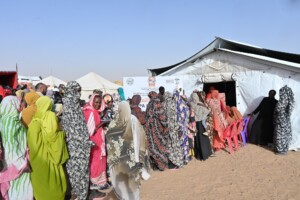Darfur Bar ‘reserved’ about mediation role in Sudan peace talks
The Darfur Bar Association (DBA) welcomes the opposition forces’ signing of the AU roadmap for the Sudanese peace talks in Addis Ababa on Monday. Yet, they express their reservations about “the neutrality of the joint mediation team”. They criticise the US special envoy as well.
The Darfur Bar Association (DBA) welcomes the opposition forces’ signing of the AU roadmap for the Sudanese peace talks in Addis Ababa on Monday. Yet, they express their reservations about “the neutrality of the joint mediation team”. They criticise the US special envoy as well.
In a statement on Wednesday, the Darfur lawyers applaud “the signing of the roadmap by most of the Sudan Appeal forces, that represent the majority of the Sudanese people”.
The Bar hopes that the roadmap will definitely lead to the ending of the wars, the loss of innocent lives, widespread displacement, and the destruction of public and private property in Sudan, “where the crises are still expanding as a result of the regime’s policies”. The government has politicised and armed tribes in Darfur and other parts of Sudan, which led to the weakening of the social fabric in Sudan, the statement reads.
The roadmap for the peace negotiations is based on two components. The first one concerns a cessation of hostilities, and political negotiations on the Two Areas (Blue Nile and South Kordofan) and Darfur, while the second component relates to the opposition’s participation in the National Dialogue, as proposed by President Omar Al Bashir in January 2014.
The document was prepared by Thabo Mbeki, chairman of the AU mediation team, in March. The head of the Sudanese government delegation and Mbeki signed it on 21 March. The opposition forces allied under the Sudan Appeal refused, insisting that a ceasefire, the delivery of humanitarian relief to the affected population in the conflict areas, the restoration of basic freedoms, and the release of political prisoners to be addressed prior to their participation in the Dialogue.
After the refusal, the International community including UN Secretary-General Ban Ki-moon, the ‘Sudan Troika’ made up of Norway, the UK, and the USA, and AU Commission Chairwoman Dr Nkosazana Dlamini-Zuma urged the opposition to sign the roadmap.
‘Oral confirmations’
The Darfur Bar however doubts about “the role of the joint mediation” in the signing of the roadmap by the Sudan Appeal forces. According to the lawyers, the strong pressure exerted by the AU High-level Implementation Level (AUHIP) “to force the allied opposition to sign exceeded its role as a neutral intermediary”.
The DBA points in this regard to the statements issued by the mediation team that the opposition groups agreed to sign the roadmap. “In particular the remarks made by the British ambassador in Khartoum blatantly revealed the extent of the international pressure on the Sudan Appeal forces, as well as the bias of the joint international mediation in favour of Khartoum”.
Also, the reservations of the Sudan Appeal forces about the contents of the roadmap have not been documented. “There is only an oral confirmation by the joint mediation team, done behind closed doors.” The Sudanese government has stated “in a clear way that it does not accept any adjustment to the roadmap document”, and “reserved the right to reject any oral commitments shared between the joint mediation and the Sudan Appeal forces”.
US Special Envoy
Another reservation concerns US Special Envoy Donald Booth, who witnessed the signing of the roadmap by the opposition. Booth recently paid a visit to Darfur. A few days after he had spoken with a number of displaced in Central Darfur’s Nierteti, security agents detained 15 of them. Five of them have been released, ten are still being held incommunicado.
The DBA blame the US special envoy for not releasing any comment on the detention campaign that started on 31 July. “The regime’s failure to keep to it pledges to the US envoy regarding the safety of the displaced [whom Booth met in Darfur …] exemplifies its clear lack of respect for its commitments on all levels,” the Bar states.
“With a biassed international mediation and the absence of genuine international guarantees to oblige the regime to respect its commitments, the crisis will continue. The Khartoum regime will elude the Addis Ababa talks and intensify its attacks on the ground, the Darfur lawyers say. They refer to the renewed bombing of the area near Guldo in Darfur’s Jebel Marra since Saturday.











 and then
and then